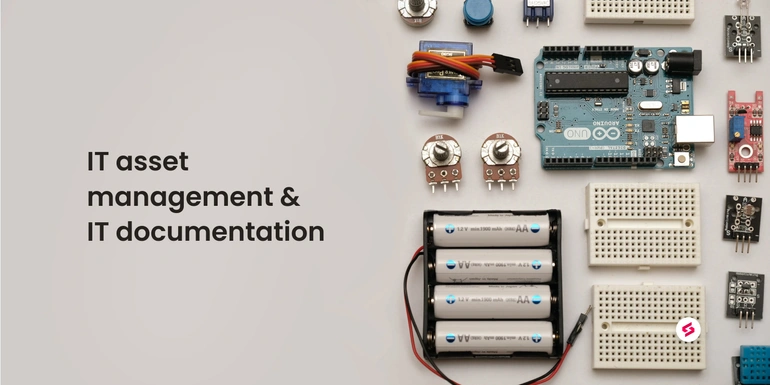MSP password management
Managed Service Providers are tasked to protect and manage numerous passwords alongside handling customer-related services and providing complex networks. MSPs usually take over the difficult and time-consuming tasks of an organization. With password management being one such responsibility they carry, it's not uncommon for MSPs to face difficulties in managing all their client’s accounts, given their practice of employing weak passwords across a series of accounts.
This is where an MSPs password management services, which involve leveraging state-of-art password security, come handy.
What is MSP password management?
Password managers are software that work via cloud on computers or mobile devices. They help create unique yet complex passwords for different accounts to facilitate safe storage and ensure easier retrieval of passwords. Password management also allows auto-filling of forms when accounts are accessed through authenticated devices.
Tech users often run into situations where they have complex passwords set for different accounts and find it difficult to recount the exact details in their hour of need. However, password managers present a quick solution to the problem..
In the case of MSPs though, this problem gets multiplied by millions, given that they are responsible for multiple small to medium-size businesses and a truckload of sensitive data.
MSP password managers provide end-users with the assurance that their data or business will not be lost, since they only have to remember one simple password. It can alone allow clients to access all their databases and security vaults at one go.
Password Managers can also assist in protecting other crucial online information like PINs, credit/debit card numbers, client’s response to questions, CVV codes etc. Password managers are usually immune to the most advanced hacking methods.
Why should MSPs adopt password management as a service?
By Incorporating password management in their services MSPs can not only white label their products but also sell them as a service to their customers. A password management system will automatically protect confidential data alongside allowing the user to share confidential data across their managed IT Network.
Password management not only offers security and protection of passwords and other confidential data but also includes a whole world of benefits, some of them being:
- Allows uninterrupted compliance to regulations: A managed regulatory service ensures compliance and documentation on behalf of their customers. Often companies have to pay heavy penalties for not complying with the basic and necessary regulations. A password manager is designed to provide compliance and documentation facilities for their clients with just a click of a single button, thereby relieving a heavy burden from the company’s shoulders.
- Enables seamless staff management: Companies need to adapt to a staff change; their credentials from the company network should be rehashed and updated when they leave their job, thereby restricting undue access. This task can be simplified by the usage of password managers. The software helps lock out the old staff and technicians based on given instructions. The job is done in very little time and in a very secure manner. This puts clients at ease that their systems are safe and secure from outside access.
- Helps provide top-notch security: Password managers also help in conducting audit logs to hold their technicians and admins accountable for their due work. The removal of blanket login credentials and adoption of shared admin rights, with each admin having different credentials, improves the security and quality of an MSPs service.
- Helps secure trust: A password management system can also help organizations gather client trust, by improving their system security. A format of procedures and policies adopted by password managers ensures better system security altogether.
By the adoption of a password management system, an MSP will be able to provide their clients with the security facilities that they need. This can also increase an MSP’s brand recognition in the respective field and help them attract new customers.
There are few things that an MSP should keep in mind while adopting a password manager:
- The ability of the password manager to store data on the cloud
- The ability to separately store customer credentials
- Providing solutions that are relevant to customer requirements
- Facilitating effective and quicker customer support services
What Problems are Solved with MSP Password Management?
MSP Password Managers not only solve the problem of security and differential storage of each unique set of customer data but also save time by amplifying login across networks. The right password management tool will also help alleviate some other serious problems that are encountered daily.
Listed below are common MSP issues that can be resolved using a password management platform:
Risk of data breaches: Heavy data breaches are a fact of life in the present times. The chance of confidential data falling in the wrong hands is significantly high today. This is extremely harmful to clients as they would be at risk of losing their entire business. The reason could be as simple as an employee using the same password for their work account as the one that was used for the data breach.
Employees would need to have a lot of passwords in different permutations and combinations to avoid any such breach, and this is more difficult than it sounds. This problem, however, can be easily tackled by the usage of password managers.
Password management software creates different secure passwords in various permutations and combinations for the user vaults, however for accessing them the client or the subsequent employee would have to remember just one master password. Therefore escaping any kind of fraud altogether. This automatically reduces any modes of data or information breaches
Time-consuming password reset tickets: It is very common to forget password reset tickets on the client’s part, given the numerous tickets that they would have to memorize, like their school name or cousin’s anniversary. This is a problem that can be avoided using an MSP with ease.
Password managers reduce the number of passwords that an employee would have to remember, therefore cutting down on the number of password reset tickets that they might have to remember. This not only saves a lot of time but also incorporates a more effective functioning of the client’s accounts.
Lack of security resolved using the multi-factor authentication systems: This is yet another feature that makes a password manager useful. The user is required to provide authentication from other devices when logging into a new system or device. Hence, an extra and more enhanced layer of security is provided to the entire system. This prevents the system from coming under any kind of unsolicited cyber attacks.
Two-factor authentication or MFA password management protects the master password from getting exposed. Even in a situation where the password is exposed, the MFA can help protect the vault from being accessed by those not authorized.
4. Unnecessary administrative hassle: It is difficult for MSPs to manage passwords for all their clients and all their end-users.
The right password management system can help make a client's password protected in the most simple way possible. In reality, the solution could be viewed and accessed by the clients.
5. Lack of an easy, single- step sign-on facility: This allows the user to sign in from different accounts and apps all at once. It is an important technology that will allow a user to spend less time typing to get the devices or accounts they need to work at.
Not every password management system offers an SSO facility, therefore it is important for users to look out for ones that offer.
4 Best MSP Password Management Practices
MSPs manage a large volume of data that involves confidential client credentials. Careless management of such data exposes it to the risk of cyber attacks that may exploit not just an MSP but their clients as well. Listed below are some of the best practices that are designed to prevent hackers from attacking or exploiting an MSP’s client.
- Employing tactical password generators: It is difficult for the end-user to create a new password with a unique combination that is incredibly difficult to crack. The client may have a problem remembering all their complex passwords. To assist in this process, organizations are encouraged to use random yet strong passwords in the proper structures based on the type of characters and length needed.
- Incorporating centralised management: Alongside holding sensitive credentials for their organization, an MSP is also tasked with managing the account of their customers. Therefore, to reduce any form of malicious activity, an MSP should incorporate centralised password management, to keep a track of credentials; which ones are being accessed, by whom, and at what time.
- Ensuring rotation of passwords: The password rotation system should take into consideration the very factor of how often the client is changing or should change their password. A proper set of policies and procedures should be leveraged to enforce the rotation of passwords, especially for the following accounts:
- Built-in systems and services
- Different business applications
- Various portals and services
- Client’s network appliances and system accounts.
- Educating clients of best password practices: It is crucial for an MSP to implement the right password practices for the security of their client’s confidential credentials. However, this particular policy would not be effective if the customer is not aware of them. Hence, MSPs should educate their clients and their employees of the various nuances of their password management system at all times and at all levels. This is applicable even for accounts that they do not believe are of much significance.
4 Features to look for in MSP password managers
Here are the top features that are imperative for evaluating a good password manager for an MSP. The list is considerate of the requirement of both the clients and MSP themselves:
1. Does it include a highly secured vault infrastructure?
A client chooses an MSP to secure their confidential data and receive assistance in implementing data smoothly.
A good password manager should ideally be inclusive of enhanced cyber technology and incorporate upgraded secured authentication, multiple-factor authentication, end-to-end encryption, and more. With the inclusion of the above mentioned elements, MSPs can ensure the data of their clients remains safe and secure.
2. Is there 24/7 accessibility and real-time updation?
Real-time synchronization is vital for all kinds of password management solutions. It is inefficient to keep nudging a colleague to update their system with the newest password. A password manager must be equipped to fix this particular problem. 24/7 automatic updation of data from apps, devices or even the basic browser is vital for a good password manager software.
3. Is the password manager easy and intuitive to use?
Simple and easy tools are more desired by modern-day clients; complex and difficult to understand systems are often found unattractive by all customers. Therefore, make sure to implement an easy-to-understand design to attract clients to your MSP.
Have your UX/UI technicians and designers create a functional and intuitive design so your clients can save more time on their end. The best password management systems are those that eliminate hassle on the part of their clients with effective password management services.
4. Is it tailored to the specific needs and requirements of the client?
An MSP needs to make its business stand out from its competition and be the go-to choice for their clients. This is vital in a busy market. It is also true that a mass-produced, generic password manager might not be the right fit for a client's unique business requirements, as they usually come with a number of limitations.
Therefore, businesses tend to work with password management service providers who can customize this important tool specific to their unique requirements. MSPs should prove to be a good fit for a client by addressing their specific needs and providing personalized service.
Final thoughts
Plenty of MSPs have understood the utility of password management systems as revenue generators. As a result, they are in a much more comprehensive position to provide their customers with the required security and protection through their services. This practice of incorporating a password manager does not only create a distinction between an MSP and its competitors but also helps them attract new and more loyal clients.
We hope this provides an in-depth insight into why as an MSP, you should include password management in your services.


